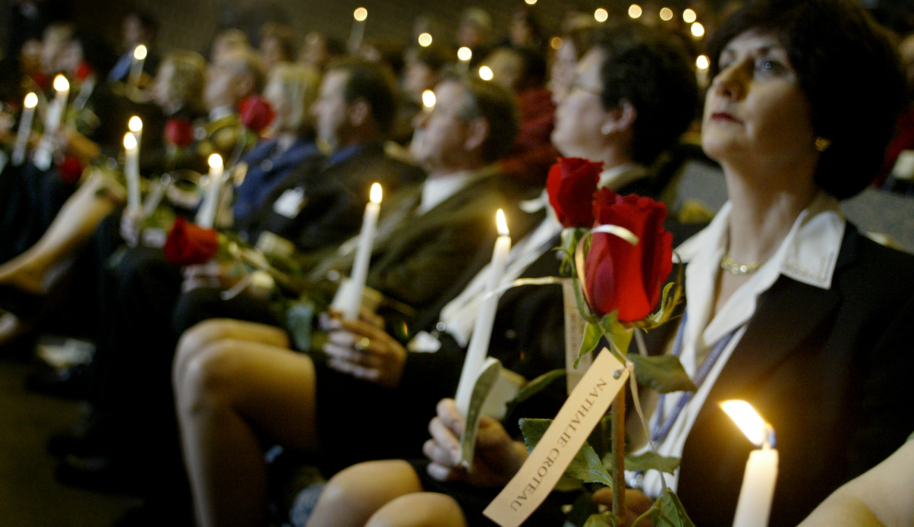More than 100 civil society organizations and service providers in Ontario have signed an open letter to Premier Ford, calling on the Ontario government to urgently declare intimate partner violence a provincial epidemic. Dated Wednesday December 6, the letter highlights the alarming femicide statistics in Ontario on the National Day of Remembrance and Action and Violence Against Women. In 2024 alone, there have been 62 femicide cases in Ontario. The most recent femicide victim was Parween Adel, who was tragically stabbed to death by her husband in Oshawa Ontario on November 17.
The letter also discusses the disproportionate impact of Ontario’s housing crisis on women, girls and 2SLGBTQQIA+ communities seeking emergency and transitional housing services. Core funding for gender-based violence prevention resources and support services is critical for early intervention and prevention, a recommendation made by Amnesty International Canada in a Shadow Report submission to the United Nations Committee on the Elimination of Discrimination Against Women (CEDAW).
READ MORE
- Amnesty International Canada Shadow Report to the UN CEDAW Committee (89th Session)
- Amnesty International and Secwepemc Nation representatives’ written submission to the Committee for the Status of Women (FEWO): This brief calls for the urgent creation of an Indigenous-led Red Dress Alert System to prevent and the crisis of missing and murdered Indigenous women, girls and 2SLGBTQQIA+ Peoples.
The full text of the letter, including the list of signatories, is below:
Wednesday, December 6th, 2023
Hon. Doug Ford, Premier of Ontario
Premier’s Office
Room 281
Legislative Building, Queen’s Park
Toronto, ON M7A 1A1
By email: premier@ontario.ca
RE: Declare Intimate Partner Violence an Epidemic in Ontario
Dear Premier Ford,
We are writing today as concerned service providers and organizations who advocate for, and provide shelter and support services to survivors of intimate partner violence (IPV) and gender-based violence (GBV).
Today, on the National Day of Remembrance and Action on Violence Against Women, your government has the opportunity to acknowledge the severity of IPV, and commit to taking action to prevent further violence, including femicide, by declaring gender-based violence and intimate partner violence for what they are: an epidemic. Femicide, the killing of women, children, trans women, 2-Spirit People and gender diverse people, is most commonly perpetrated by current or former intimate partners (31%). In the past year, there have been 62 recorded femicides in Ontario. That is 62 people whose lives were taken by violence. One femicide is too many. 62 femicides is an epidemic.
We bring this recommendation forward to honour the victims of intimate partner violence, including Carol Culleton, Anastasia Kuzyk and Nathalie Warmerdam, three women who were killed by the same man known to have a history of IPV. This call to action is derived from the first of 86 recommendations from the Culleton, Kuzyk and Warmerdam Inquest Report, to declare intimate partner violence an epidemic.
As service providers and advocates, we are seeing firsthand the heightened number of women, gender diverse people and their children fleeing violence and know how critical support for the GBV sector is right now. Currently in the province, there are more women, gender diverse people, and children in need of emergency shelter than there are beds to offer. Across Canada, approximately 699 women and 236 children are turned away nightly because shelters are full. According to Statistics Canada, 2021 marked the seventh consecutive year that police-reported cases of intimate partner violence rose, and we know that due to the complexity and stigma of IPV, it continues to be an underreported crime. We also know that women and gender diverse people living with disabilities, precarious immigration status, those living in rural areas, and those who are Indigenous, newcomers or racialized face increased levels of violence and are at greater risk of intimate partner violence.
With over 70 municipalities across Ontario declaring Intimate Partner Violence an epidemic, we can confidently say that Ontarians share our urgency in publicly acknowledging the devastating impacts of IPV and GBV and the need to take urgent action to address this violence.
We bring this recommendation forward because we know what is possible when the lives and wellbeing of women, gender diverse people and children are prioritized. When governments and policymakers address IPV and GBV from every angle, and make meaningful investments into violence prevention, early intervention, and survivor support services, they are investing in a province where women, girls, and gender diverse people are safe to thrive, grow, and reach
By taking action today and naming this violence for what it is, an epidemic, you would not only be acknowledging the gravity of this violence, but also demonstrating leadership that can save lives across the province. We urge you to make this vital commitment to the safety and wellbeing of women, gender diverse people and children. Call this violence what it is: an epidemic.
Sincerely,
Abuse Hurts
Abuse Logic
Access Alliance Multicultural Health and Community Services
Action ontarienne contre la violence faite aux femmes
Alternatives for Women
Amnesty International Canada’s English-Speaking Section
Anduhyaun Inc.
Armagh House
Assaulted Women’s Helpline
Atikameksheng Anishnawbek
Aura Freedom International
Barbra Schlifer Commemorative Clinic
Bethesda House
Black Greek Community Health Centre
Black Women In Motion
Canadian Center for Women’s Empowerment
Canadian Federation of Students / Fédération Canadienne des étudiant.e.s
Canadian Women’s Foundation
Catholic Family Services of Toronto
CCRC
Centre de santé communautaire de l’Estrie
Centre Novas-CALACS francophone de Prescott-Russell
Centre Victoria pour femmes
CHADWIC HOME INC
Chatham-Kent Sexual Assault Crisis Center
Circle Community LandTrust
Coalition of Muslim Women of KW
Community Family Services of Ontario
Community Resource Centre, Killaloe
Cornerstone Family Violence Prevention Centre
Davenport-Perth Neighbourhood and Community Health Centre
Domestic Abuse Services Oxford
Elliot Lake Women’s Group Inc.
Embrave Agency to End Violence
Engage Barrie Organization
ÉSO SEMEL OHT
Family Service Toronto
Family Transition Place
Flemingdon Health Centre
Future North
Gillian’s Place (Women’s Place St. Catharines & District Inc.)
Halton Women’s Place
Help Her Recover Trauma Relief for the Community
Herizon House
Hiatus House
Hope for Refugee International
Huronia Transition Homes
Inasmuch House, Mission Services of Hamilton
Ingamo Homes
Interfaith Counselling Centre, ICC
Interval House of Ottawa
Janet K. Ayieni
Jewish Family and Child Services
Kawartha Sexual Assault Centre
KCWA Family and Social Services
KGCFS
Krasman Centre
Lakehead University Student Union
LAMP Community Health Centre
Lanark County Interval House & Community Support
Le Rendez-vous de Vallée Est
Leadership féminin Prescott-Russell
Luke’s Place
Maison Interlude House Inc.
Maison McCulloch Hospice
Malvern Family Resource Centre
Manitoulin Family Resources
Mattawa Women’s Resource Centre
Meta4 Communications
Meta4 Consulting
Mind-Aid Muskoka
Murray McKinnon Foundation
Muskoka Parry Sound Sexual Assault Services
My Friend’s House, Collingwood Crisis Centre
Nelson House of Ottawa Carleton
North York Women’s Shelter
Northwestern Ontario Women’s Centre
OCASI-Ontario Council of Agencies Serving Immigrants
Ontario Association of Interval & Transition Houses
Ontario Coalition for Better Child Care
Ontario Coalition of Rape Crisis Centres (OCRCC)
Ontario Network of Sexual Assault/Domestic Violence Treatment Centres
Optimism Place Women’s Shelter and Support Services
Ottawa Basketeers
Ottawa Rape Crisis Centre
Parkdale Queen West Community Health Centre
PARN
PDAN – Peterborough Domestic Abuse Network
Planned Parenthood Ottawa
Planned Parenthood Toronto
Project Agape
Ralph Thornton Community Centre
Red Door Family Shelter
Regent Park Community Health Centre
Renfrew Victoria Hospital Regional Assault Care Program
Réseau des femmes immigrantes francophones de Prescott-Russell (RéFIF-PR)
REVIVE
Rexdale Community Health Centre
Sandgate Women’s Shelter of York Region Inc
Sexual Assault Centre Kingston
Sexual Assault Support Centre of Waterloo Region
South Asian Women’s & Immigrants Services Inc.
South Riverdale Community Health Centre
St Peter’s United Church of Sudbury
Stonegate Community Health Centre
Sudbury and Area Victim Services
Sudbury District Restorative Justice Reparatrice du District de Sudbury
The Canadian Centre to End Human Trafficking
The Children’s Aid Society of the Districts of Sudbury and Manitoulin
The Denise House/Sedna Women’s Shelter & Support Services
The Salvation Army Sudbury Cedar Place, Emergency Shelter for Women and Families
Three Oaks Foundation
Thrive Counselling
Thunder Bay and District Coordinating Committee to End Woman Abuse
Times Change Women’s Employment Service
Timmins and Area Women in Crisis
Timmins Family Counselling Center.
Toronto Neighbourhood Centres
Ukrainian Centre
Vaughan Community Health Centre
Victim Services of Durham Region
Victim Services of Peterborough and Northumberland
Victim Services of Renfrew County Inc.
Victim Services Toronto
Western Ottawa Community Resource Centre
White Ribbon
Willowbridge Community Services
WomanACT
Women In Crisis (Algoma) Inc.
Women’s Habitat of Etobicoke
Women’s Rural Resource Centre
Women’s Rural Resource Centre – Strathroy
Women’s Centre of York Region
Women’s Crisis Services of Waterloo Region
Women’s Health in Women’s Hands CHC
Women’s Legal Education and Action Fund (LEAF)
Women’s Sexual Assault Centre of Renfrew County
Women’s Support Network of York Region
Working for Change
Yellow Brick House
York Region Centre for Community Safety
YW Kitchener-Waterloo
YWCA Cambridge
YWCA Durham
YWCA Hamilton
YWCA Muskoka
YWCA Niagara Region
YWCA Peterborough-Haliburton
YWCA St. Thomas-Elgin
YWCA Sudbury
YWCA Toronto













